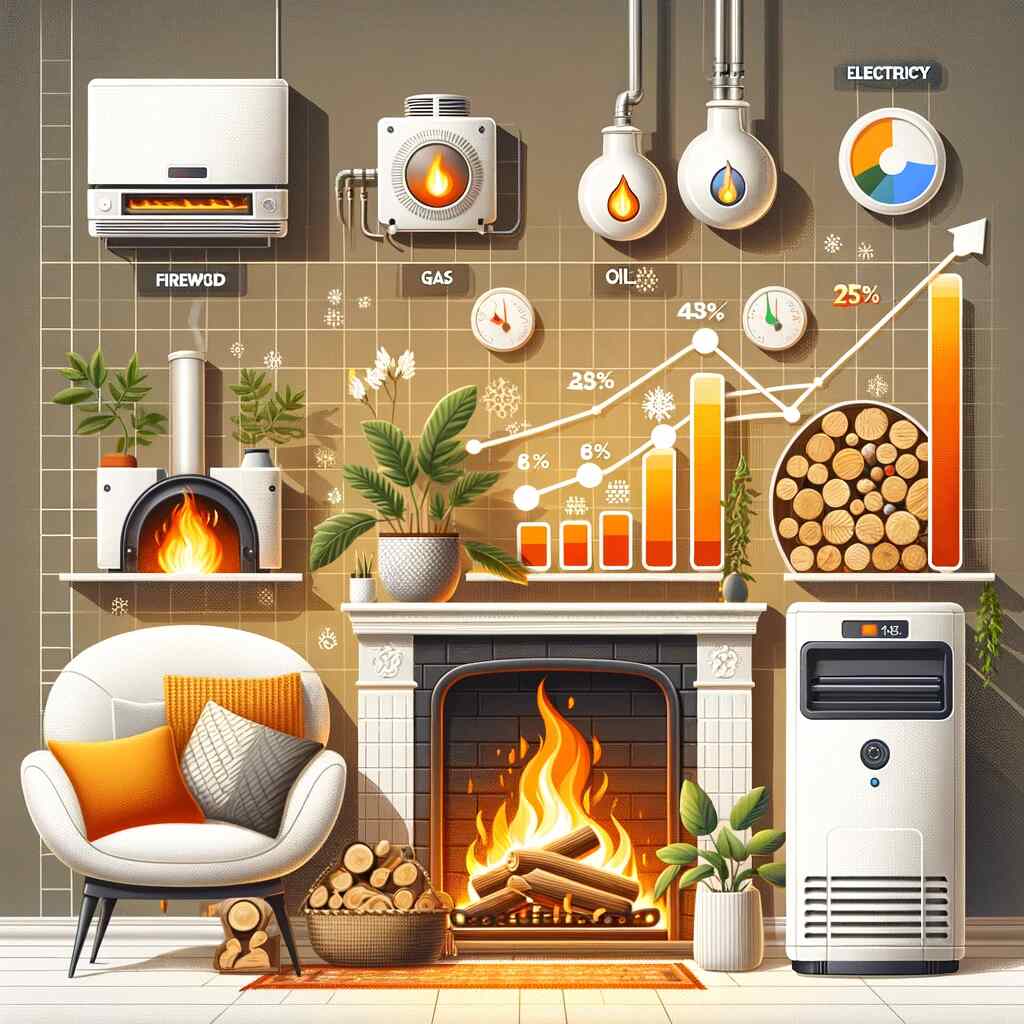Heating our homes is a fundamental need for comfort and survival, especially during the colder months. To meet this need, we have a variety of heating fuel options available, including firewood, gas, oil, and electricity. Each of these fuels has its advantages and disadvantages, but when it comes to efficiency, how does firewood stack up against the alternatives?
In this comprehensive article, we will delve into the world of heating fuels, focusing on the efficiency of firewood compared to gas, oil, and electricity. We will explore the factors that influence efficiency, environmental considerations, cost-effectiveness, and more to provide you with a well-rounded understanding of which heating fuel might be the best fit for your needs.
Understanding Heating Efficiency
Before we dive into the comparison, let’s establish what heating efficiency means. In the context of heating, efficiency refers to how effectively a fuel source can convert its energy into heat for your home. Higher efficiency means more heat is generated for the same amount of fuel consumed, which is not only cost-effective but also environmentally friendly.
-
Firewood Efficiency
Firewood, a traditional and renewable heating fuel, has been used for centuries. The efficiency of firewood depends on several factors, including the type of wood, moisture content, and the efficiency of the stove or fireplace used.
a. Wood Type: Not all woods are created equal. Hardwoods like oak, maple, and hickory generally provide more heat per unit of volume compared to softwoods like pine or spruce. Hardwoods tend to burn slower and produce more sustained heat.
b. Moisture Content: The moisture content of firewood is critical for efficiency. Wet or green wood contains a significant amount of water, which must be evaporated before the wood can combust effectively. This process wastes energy and reduces overall efficiency. Properly seasoned firewood, which has been dried to a moisture content of around 20% or less, burns more efficiently.
c. Stove Efficiency: The type and condition of your wood-burning stove or fireplace also play a crucial role in efficiency. Modern, EPA-certified stoves are designed for efficient combustion, reducing emissions and improving overall heat output.
-
Gas Efficiency
Natural gas is a commonly used heating fuel in many households due to its convenience and relatively low cost. Its efficiency is influenced by factors such as the heating system’s design and the age of the equipment.
a. Furnace Efficiency: Modern gas furnaces are highly efficient, with AFUE (Annual Fuel Utilization Efficiency) ratings often exceeding 90%. Older models, however, can be significantly less efficient, leading to energy waste.
b. Boiler Efficiency: Gas boilers provide hot water for heating systems. Their efficiency is also measured in AFUE, and newer models tend to be more efficient than older ones.
-
Oil Efficiency
Heating oil is another option, although it has become less common in recent years due to environmental concerns and the rising cost of oil. Oil heating efficiency depends on the burner’s design and the regularity of maintenance.
a. Burner Efficiency: Oil burners can be relatively efficient, with modern models achieving efficiency ratings of 80% or higher. Regular maintenance is essential to ensure optimal performance.
-
Electric Efficiency
Electric heating is generally considered less efficient than other options, primarily due to the way electricity is generated and transmitted. Electric heaters convert electrical energy directly into heat through resistive heating elements.
a. Conversion Efficiency: The efficiency of electric heating is relatively high within the unit itself, but the overall efficiency depends on the source of electricity. If the electricity is generated from fossil fuels, such as coal or natural gas, the overall environmental impact and efficiency are lower compared to electricity generated from renewable sources.
Environmental Considerations
Efficiency is not the only factor to consider when evaluating heating fuels. Environmental impact is a critical aspect, given the growing concern for climate change and air quality. Let’s examine how firewood, gas, oil, and electricity compare in terms of their environmental footprint.
-
Firewood and the Environment
Firewood is considered a renewable resource, as long as trees are harvested sustainably and replanted. However, the environmental impact of firewood depends on various factors:
a. Carbon Emissions: Burning firewood releases carbon dioxide (CO2) into the atmosphere, contributing to greenhouse gas emissions. While firewood is considered carbon-neutral because the carbon released during combustion is offset by the carbon absorbed by growing trees, the efficiency of the burning process affects how much CO2 is emitted.
b. Local Impact: The environmental impact of firewood can be more significant on a local scale. Burning wood can produce particulate matter and other pollutants that affect air quality.
c. Sustainable Practices: To minimize the environmental impact of firewood, it’s crucial to use sustainably harvested wood and employ efficient burning methods, such as those promoted by EPA-certified stoves.
-
Natural Gas and the Environment
Natural gas is a fossil fuel, and its extraction and use have environmental consequences:
a. Greenhouse Gas Emissions: Natural gas combustion emits CO2 and methane (CH4), a potent greenhouse gas. While natural gas is often considered cleaner than coal or oil, it still contributes to global warming.
b. Extraction Impact: The extraction of natural gas through hydraulic fracturing (fracking) can have adverse environmental effects, including water contamination and habitat disruption.
-
Heating Oil and the Environment
Heating oil is also a fossil fuel with environmental drawbacks:
a. Greenhouse Gas Emissions: Like natural gas, heating oil combustion releases CO2, and there is potential environmental harm from extraction.
b. Oil Spills: The storage and transportation of heating oil can lead to oil spills, which have devastating consequences for the environment.
-
Electricity and the Environment
Electricity generation varies widely in terms of environmental impact:
a. Fossil Fuel Electricity: If your electricity is primarily generated from fossil fuels, such as coal or natural gas, the environmental impact is similar to natural gas or heating oil, with CO2 emissions and air pollutants.
b. Renewable Electricity: Using electricity from renewable sources, such as wind, solar, or hydroelectric power, significantly reduces the environmental footprint of electric heating.
Overall, when it comes to environmental considerations, firewood has the potential to be relatively sustainable if harvested and used responsibly. However, the impact largely depends on local practices and the choice of wood-burning equipment. Natural gas, heating oil, and electric heating can be less environmentally friendly, but their impact varies based on energy sources and efficiency.
Cost-Effectiveness
Efficiency and environmental impact are essential factors in choosing a heating fuel, but cost-effectiveness also plays a significant role. The cost of heating can vary significantly based on the type of fuel, the region, and market fluctuations. Let’s examine the cost-effectiveness of firewood, gas, oil, and electricity.
-
Firewood Cost-Effectiveness
The cost of firewood varies depending on several factors:
a. Location: Availability and cost of firewood depend on your geographic location and proximity to forests or suppliers.
b. Seasoning: Seasoned firewood is typically more expensive than green wood due to the additional effort required for drying.
c. Equipment: The upfront cost of purchasing a wood-burning stove or fireplace insert can be significant but pays off over time through savings on heating bills.
d. Labor: Gathering, chopping, and splitting firewood can require substantial labor, although some people enjoy the physical activity and find it a satisfying part of using firewood for heating.
Overall, the cost-effectiveness of firewood can be favorable in areas with ample wood resources, especially if you have access to free or low-cost wood and are willing to invest in an efficient wood-burning appliance.
-
Gas Cost-Effectiveness
The cost of natural gas varies depending on market conditions and your location. In regions with abundant natural gas reserves, it is often one of the most cost-effective heating options. However, it’s essential to consider the cost of equipment installation and maintenance when assessing overall cost-effectiveness.
-
Oil Cost-Effectiveness
Heating oil prices can be subject to significant fluctuations, making it challenging to predict long-term cost-effectiveness. Additionally, the need for oil deliveries and the potential for oil spills should be considered when evaluating the overall cost of heating with oil.
-
Electric Cost-Effectiveness
Electric heating costs can be relatively high, especially in areas with expensive electricity rates. While electric heating equipment is often less expensive to install than some other options, the ongoing operational costs can add up over time.
To determine the cost-effectiveness of a particular heating fuel for your situation, consider factors such as local fuel prices, the efficiency of your heating equipment, and any incentives or subsidies available for energy-efficient appliances.
Comparing Heating Fuels
Now that we’ve explored various aspects of firewood, gas, oil, and electricity for heating, let’s compare them in terms of efficiency, environmental impact, and cost-effectiveness:
-
Efficiency Comparison:
- Firewood: Efficiency depends on wood type, moisture content, and stove efficiency, typically ranging from 60% to 80%.
- Natural Gas: Modern gas furnaces and boilers can achieve efficiency ratings of over 90%.
- Heating Oil: Oil burners can reach efficiency ratings of 80% or higher with regular maintenance.
- Electricity: Electric heating tends to have lower overall efficiency due to energy conversion losses during electricity generation.
-
Environmental Impact Comparison:
- Firewood: Environmental impact varies but can be relatively sustainable with responsible harvesting and efficient stoves.
- Natural Gas: Emissions include CO2 and methane, with potential environmental harm from extraction (fracking).
- Heating Oil: Emissions include CO2, and there is a risk of oil spills during storage and transportation.
- Electricity: Impact varies based on energy sources, with renewable electricity being the most environmentally friendly option.
-
Cost-Effectiveness Comparison:
- Firewood: Cost-effectiveness depends on location, availability, equipment costs, and labor.
- Natural Gas: Often cost-effective, especially in regions with abundant natural gas resources.
- Heating Oil: Prices can be volatile, making long-term cost-effectiveness uncertain.
- Electricity: Cost-effectiveness varies by location and electricity rates, with potential savings through energy-efficient appliances.
Ultimately, the choice of heating fuel should consider your individual circumstances, including your location, access to resources, budget, and environmental values.
Tips for Increasing Heating Efficiency
Regardless of the heating fuel you choose, there are several strategies you can employ to maximize efficiency and reduce energy consumption:
- Proper Insulation: Ensure your home is well-insulated to minimize heat loss.
- Regular Maintenance: Schedule routine maintenance for your heating equipment to keep it running at peak efficiency.
- Energy-Efficient Appliances: Invest in energy-efficient heating appliances and thermostat controls.
- Programmable Thermostat: Use a programmable thermostat to adjust temperature settings based on your daily schedule.
- Seal Air Leaks: Identify and seal any gaps or cracks in your home’s windows, doors, and walls to prevent drafts.
- Zone Heating: Heat specific areas of your home rather than the entire space if possible, using space heaters or zoned heating systems.
- Renewable Energy: If using electricity, consider sourcing it from renewable energy providers to reduce your carbon footprint.
Conclusion
Choosing the right heating fuel for your home involves a careful evaluation of efficiency, environmental impact, and cost-effectiveness. Firewood, gas, oil, and electricity each have their pros and cons, making the decision a complex one.
Firewood offers a renewable and potentially sustainable heating option when used responsibly with efficient equipment. Natural gas is often cost-effective but has environmental concerns related to extraction and emissions. Heating oil’s cost-effectiveness can be unpredictable, and it carries the risk of oil spills. Electric heating varies in cost-effectiveness based on electricity rates and energy source, with renewable electricity being the most environmentally friendly option.
Ultimately, the best heating fuel for your home depends on your unique circumstances, priorities, and values. Whether you choose the timeless warmth of a wood-burning stove, the convenience of gas, the reliability of oil, or the simplicity of electricity, making informed choices about your heating fuel can help you stay warm and comfortable while minimizing your environmental impact and energy costs.










